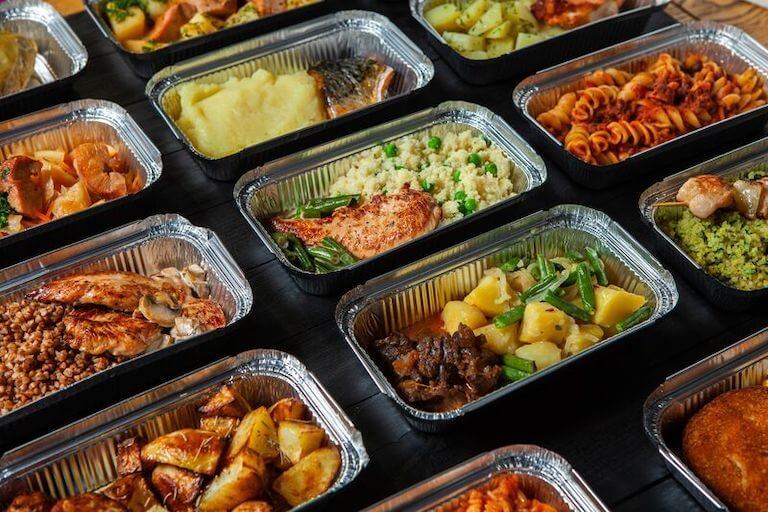Listen to This Article:
How can someone identify the “top careers in food?” What criteria is this based on? And which one could be right for you?
When it comes to the best careers in food, there’s no one-size-fits-all path. What excites one culinary professional might not appeal to another. That’s why we’ve outlined thirteen promising food careers across different specialties—complete with average salaries, job growth projections, skill requirements, career timelines, and possible educational pathways at Escoffier.
Note: Outcomes may vary based on individual experience, location, and other factors. This article offers general insights and is not a guarantee of employment or earnings.
Choosing the Right Culinary Career Path For You
Before diving into specific roles, it may be helpful to jot down:
- Your desired work environment. Do you prefer to work in an exciting but demanding kitchen? Maybe you want to become a famous chef decorated in Michelin Stars, or you might prefer more work-life balance.
- Whether you prefer solo or collaborative work. Do you see yourself in a busy kitchen setting, or maybe operating a business from home?
- Income goals. Careers in the food industry can have a range of incomes. Consider where this ranks in your priorities.
- Long-term growth potential and schedule flexibility. Some food jobs have more career growth potential than others.
- How much time and training you’re willing to invest upfront. A culinary education typically isn’t required, but it may increase your confidence and chance of landing the jobs you want.
Taking time to brainstorm what you want (and don’t want) in a food industry job can be a great first step to outlining your career. But, if you’re totally unsure about what you’re looking for, that’s okay too. The industry can be a great place to explore different roles without having to make a huge commitment.
Explore 13 Careers in the Food Industry
From behind-the-scenes creatives to kitchen leaders and wellness professionals, discover diverse roles in the culinary world. Each career comes with its own path, timeline, and skills.
1. Executive Chef: Lead a Kitchen & Build Your Culinary Legacy
An executive chef is typically in charge of the kitchen. This person may create the menu and recipes, manage costs, set pricing, track inventory, and be responsible for staffing (which includes hiring, firing, and training). The rest of the cooks and chefs all look to the executive chef for direction and guidance, day in and day out.
People who thrive as executive chefs are usually comfortable being in charge and don’t get frazzled when they have to make tough decisions. It can be a difficult job, but a rewarding one, too.
It often takes years of training, education, and hands-on experience to become an executive chef. Some chefs attend culinary school and build on that educational foundation through work experience, practice, and self-study.
What You May Need to Know if You Want to be an Executive Chef
| Salary | Average: $87,185 Range: $78,448 – $96,791 |
| Key Skills That May Be Required | Leadership, menu development, budgeting, kitchen operations |
| Estimated Years of Experience Needed | 5 years of experience as a chef de cuisine, executive sous chef, or chef in charge of food production |
| Possible Educational Pathway | Culinary Arts |
Note: Salary updated as of July 01, 2025. Job outcomes may vary by location, experience, and other factors. Obtaining a culinary degree or diploma does not guarantee any job position.
Get Advice from Top Executive Chefs on The Ultimate Dish Podcast
2. Recipe Developer: Create Dishes for Restaurants, Media Outlets, & More
Recipe developers may create recipes for restaurants, cookbooks, television shows, and magazines. They may work alongside chefs, or they may be responsible for creating the recipe on their own.
A recipe developer has to find the right balance of ingredients and textures, and then they also have to explain how to create a dish step-by-step, in clear language. Education can be key to understanding the right cook times, internal temperatures, flavor profiles, and seasoning techniques. Beyond taste, food safety can be at stake. Poor recipes could lead to undercooked chicken, cross-contamination, or other hazards for diners.
Not all recipe developers have commercial kitchen experience, but it can help—especially if you plan to create recipes for restaurant use. That work experience can help the recipe developer to understand what is possible and the best workflows for a busy kitchen.
What You May Need to Know if You Want to be a Recipe Developer
| Salary | Average: $89,219 Range: $70,421 – $112,287 |
| Key Skills That May Be Required | Food science, creativity, communication, testing and iteration, staging |
| Estimated Years of Experience Needed | Varies, though many recipe developers have at least some professional kitchen experience and/or a culinary education |
| Possible Educational Pathway | Food Entrepreneurship and/or Culinary Arts |
Note: Salary updated as of July 01, 2025. Job outcomes may vary by location, experience, and other factors. Obtaining a culinary degree or diploma does not guarantee any job position.

Recipe creation can take creativity and a wealth of background knowledge.
3. Personal Chef Jobs: Cook Independently and Control Your Schedule
The entrepreneurial personal chef may have more control over their work life than other culinarians. Personal chefs batch pre-made meals that their clients can then heat and eat. The clients get the convenience of homemade meals without meal planning, grocery shopping, prep, or cooking.
While some personal chefs work for larger companies, many others work independently, which means they can manage their own hours and create their own recipes. Of course, that also means it could be hard to take time off, as clients are still expecting their meals. But for many, the autonomy is worth it. While no particular education is required to be a personal chef, a culinary or food entrepreneurship degree or diploma that demonstrates expertise and professionalism may make it easier to land clients with.
What You May Need to Know if You Want to be a Personal Chef
| Salary | Average: $69,673 Range: $43,000 – $151,000 |
| Key Skills That May Be Required | Menu planning, time management, food safety, client communication, marketing, adaptability |
| Estimated Years of Experience Needed | According to many in the industry, becoming a personal chef requires a strong network, which many develop during 1-2 years of culinary school or professional culinary work |
| Possible Educational Pathway | Culinary Arts, Food Entrepreneurship, or Holistic Nutrition & Wellness |
Note: Salary updated as of June 25, 2025. Job outcomes may vary by location, experience, and other factors. Obtaining a culinary degree or diploma does not guarantee any job position.
4. What Does a Food Stylist Do? Behind-the-Scenes in Culinary Visuals
A food stylist is responsible for making dishes or spreads look just right. They often work behind the scenes on television and film sets, magazine photo shoots, and commercial marketing shoots.
They may work with food photographers or with a film’s set designers and prop masters to perfect the look of each plate. And on a film or television set, if the talent has to eat the food, the stylist has to come prepared. They may have to re-set that plate of pasta each time there’s a new take, which means making the same dish over and over.
Some food stylists even get to work with celebrities. Escoffier graduate and food stylist Lisa Spychala has worked with celebrity chefs like the late Anne Burrell and Carla Hall. She even made a commercial with actor Freddie Prinze, Jr.
What You May Need to Know if You Want to be a Food Stylist
| Salary | Average: $73,356 Range: $62,830 – $94,519 |
| Key Skills That May Be Required | Aesthetic eye, trend tracking, plating skills, food science knowledge, collaboration, patience, attention to detail |
| Estimated Years of Experience Needed | Most work as a food stylist assistant for 2-3 years while building their portfolio, unique style, and network |
| Possible Educational Pathway | Culinary Arts Degree or Diploma with supplemental coursework in photography recommended |
Note: Salary updated as of July 1, 2025. Job outcomes may vary by location, experience, and other factors. Obtaining a culinary degree or diploma does not guarantee any job position.
5. Pitmaster Career Path: The Art of Barbecue and Slow Smoking
You plan to serve a wonderful barbecue starting at noon each day. But it takes 18 hours to smoke your briskets. Basic math says you’re going to be in for some late nights.
Pitmasters are meat experts. They cook their proteins low and slow to break down the connective tissue and create impossibly tender ribs, briskets, pulled pork, and more. It’s a labor of love that involves careful attention to detail and takes time.
Consistency is key, which takes practice. Some pitmasters get a foundational education in culinary school, where they can explore food safety and sanitation, practice their knife skills, and more. After that, it’s all about putting in the hours at the grill or smoker.
What You Need to Know if You Want to be a Pitmaster
| Salary | Average: $100,006 Range: $87,832 – $113,330 |
| Key Skills That May Be Required | Meat science and prep, smoking techniques, time management, knife skills, fire and equipment control, food safety |
| Estimated Years of Experience Needed | Varies, but many apprentice as a pitmaster assistant for several years |
| Possible Educational Pathway | Culinary Arts and recommended BBQ-focused externship |
Note: Salary updated as of July 1, 2025. Job outcomes may vary by location, experience, and other factors. Obtaining a culinary degree or diploma does not guarantee any job position.
6. Chocolatier Jobs: Craft Truffles, Bonbons & Chocolate Showpieces
Chocolatiers are dessert professionals who specialize in—what else?—chocolate. They know where the best cacao beans come from and the right proportions of cacao, sugar, and milk. They make chocolate truffles, chocolate bars, bonbons, chocolate-covered fruits and nuts, and more. Some make elaborate chocolate sculptures as showpieces for events using advanced tempering and molding techniques.
Chocolatiers may work in a large-scale commercial capacity, or they may work in a boutique chocolate shop or pastry shop.
To discover the basics of working with chocolate, many chocolatiers attend pastry school. Others may get their education as apprentices to a chocolate maker.
What You Need to Know if You Want to be a Chocolatier
| Salary | Average: $25,747 Range: $20,955 – $29,090 |
| Key Skills That May Be Required | Chocolate tempering, food science, precision, patience, flavor development, visual presentation |
| Estimated Years of Experience Needed | 1-2 years of culinary education, specialized training, and 1+ years of relevant entry-level work |
| Possible Educational Pathway | Baking & Pastry Arts |
Note: Salary updated as of Aug. 1, 2025. Job outcomes may vary by location, experience, and other factors. Obtaining a culinary degree or diploma does not guarantee any job position.
Get Inspired by Chocolatier Katrina Markoff
- Listen to luxury chocolate maker Katrina Markoff, Founder, CEO, and Chocolatier of Vosges Chocolat, as she shares her fascinating story with Escoffier on The Ultimate Dish podcast.
7. Chef Consultant Role: Help Restaurants Innovate and Improve
If you want a job that stays fresh and consistently offers new challenges, consider becoming a chef consultant.
Chef consultants work on specific projects or goals for foodservice businesses and food producers. They may help a restaurant to create new training materials and programs, or to look for efficiencies in their current operations. They may help a food manufacturer develop a new product and bring it to market. They may also become specialized in a specific area, like Hazard Analysis Critical Control Point programs (HACCP) or cost-cutting measures.
The variability of this role can keep things interesting, but it’s not for everyone.
“People see my position in my career field and they’re like ‘Oh wow, that seems so cool. You’re independent, and you only have to answer to yourself.’” says Escoffier graduate and chef consultant Chris McAdams, who adds that there’s a lot of pressure along with the freedom.
“If (something) goes wrong, it’s on you,” he says. “You can’t screw up a project; everything has to be 100. And if it’s not, you have to be the one to fix it.”
Although a career as a chef consultant can be fulfilling, McAdams wants to make clear that it demands exceptional responsibility and drive.
Chef consultants must have a high level of expertise, so this is a role that is often best for experienced chefs. A foundation in culinary school is highly recommended, followed by several years of work in the type of environment you’d like to consult in.
Chef Consultants Can Build Their Own Specialties
- Escoffier graduate and Research & Development Chef Consultant Chris McAdams has created his own niche, helping brands to develop their products and work on their marketing. Get inspired by his story on The Ultimate Dish podcast.
What You May Need to Know if You Want to be a Chef Consultant
| Salary | Average: $76,855 Range: $62,155 – $93,054 |
| Key Skills That May Be Required | Culinary expertise, business acumen, project management, specialty knowledge, client relations |
| Estimated Years of Experience Needed | Many years of professional kitchen experience, including several as an executive chef, are usually needed |
| Possible Educational Pathway | Culinary Arts, Food Entrepreneurship, and/or Hospitality & Restaurant Operations Management |
Note: Salary updated as of Aug. 1, 2025. Job outcomes may vary by location, experience, and other factors. Obtaining a culinary degree or diploma does not guarantee any job position.
8. Building a Career as a Pastry Chef: Turn Desserts into a Full-Time Profession
If all other food is just an obstacle between you and dessert, you may wish to reach for the career of pastry chef. Pastry chefs work in many of the culinary segments, like restaurants, hotels, bakeries, and pastry shops. In a restaurant, the pastry chef may be responsible for the entire dessert program, including sweet sauces, baked goods, ice creams, and more. And in a bakery setting, the pastry chef could focus more on shelf-stable items like pâtisserie.
The work combines baking with high-end finish work for beautiful pastries or finished desserts. Pastry chefs often complete a degree or diploma in baking and pastry to develop the basics of their craft. Then they may get jobs in bakeries, pastry shops, or restaurants to continue honing and improving their skills.

Precision is key for pastry chefs to craft flawless pastries.
What You May Need to Know if You Want to be a Pastry Chef
| Salary | Average: $69,423 Range: $60,652 – $79,305 |
| Key Skills That May Be Required | Baking science, artistic skill, time management, consistency and precision |
| Estimated Years of Experience Needed | Several years of working relevant entry-level jobs, a culinary education, and/or an apprenticeship is typically required |
| Possible Educational Pathway | Baking & Pastry Arts |
Note: Salary updated as of Aug. 1, 2025. Job outcomes may vary by location, experience, and other factors. Obtaining a culinary degree or diploma does not guarantee any job position.
9. Start a Ghost Kitchen: A Lower-Cost Culinary Business Model
If you want to get your food out there with a lower financial investment, consider starting a ghost restaurant. Ghost restaurants operate out of commercial kitchen space and create food exclusively for to-go and/or delivery operations. With no storefront and no service staff, they can be a more affordable way to get started as a food entrepreneur.
And once you’ve built up a loyal customer base, you may be able to “graduate” to a restaurant or food truck (if that appeals to you).
What You May Need to Know if You Want to be a Ghost Restaurant Owner
| Salary | Varies considerably, but they are generally considered more profitable than traditional restaurants |
| Key Skills That May Be Required | Business planning, marketing, operations management, food safety, delivery logistics, networking and attracting investors |
| Estimated Years of Experience Needed | Varies significantly |
| Possible Educational Pathway | Food Entrepreneurship, and/or Hospitality & Restaurant Operations Management |
Note: Job outcomes may vary by location, experience, and other factors. Obtaining a culinary degree or diploma does not guarantee any job position.

Ghost restaurants serve to-go and delivery customers only.
10. Restaurant Manager Careers: Lead Teams and Oversee Daily Operations
A restaurant manager is responsible for executing the owner’s vision. They can help guide the rest of the team in creating a cohesive and pleasant restaurant experience for guests and may be responsible for hiring, firing, training, and day-to-day operations. They may stop by tables to chat with guests throughout the shift, and can help to ease interpersonal conflict among staff.
Most restaurant managers have extensive restaurant experience before they get their first management role. They may start out as hosts or servers and work their way up.
What You May Need to Know if You Want to be a Restaurant Manager
| Salary | Average: $57,265 Range: $44,234 – $70,743 |
| Key Skills That May Be Required | Team management, customer service, scheduling, budgeting, conflict resolution |
| Estimated Years of Experience Needed | Varies significantly depending on restaurant type |
| Possible Educational Pathway | Hospitality & Restaurant Operations Management |
Note: Salary updated as of July, 01, 2025. Job outcomes may vary by location, experience, and other factors. Obtaining a culinary degree or diploma does not guarantee any job position.
11. Become a Health Coach: Help Clients Reach Wellness Through Food
For a career in food at the intersection of wellness and great eating, consider becoming a health coach.
“A lot of our health can be affected by our fork, by the food that we put in our mouth,” board-certified holistic health coach Julie Peláez says on The Ultimate Dish podcast.
That philosophy underscores just how deeply food is tied to every part of our well-being—and how meaningful it can be to help others transform their lives through nutrition and coaching.
Health coaches can help their clients to reach their goals, whether that’s better sleep, less stress, or weight loss by making recommendations regarding healthy diet, fitness and physical activity, managing anxiety, and more.
There are many paths to becoming a health coach, but an education in Holistic Nutrition and Wellness can be a great place to start. Through coursework in subjects such as culinary foundations, nutrition, special diets, coaching techniques, and more, graduates may be prepared to get their first jobs working under more experienced health coaches.
“We’re uniquely positioned to help students navigate cooking for health and how other forces influence a person’s lifelong well-being,” says Dr. Stephanie White, Assistant Professor in Culinary Medicine at the University of Cincinnati, who helped develop Escoffier’s Plant-Based programs and served as Director of Academics. “We also discuss fundamental coaching techniques they may use to assist others in navigating their wellness journey. Learning these skills can help students pursue multiple avenues relevant to health and wellness—from being a part of a culinary team that creates dishes for companies or organizations looking to nourish their employees/customers, community food education programs, coaching, and health educators.”
Finding Balance with Health Coach Julie Peláez
- Board-Certified holistic health coach Julie Peláez shares her story and her wellness philosophy on The Ultimate Dish podcast.
What You May Need to Know if You Want to be a Health Coach
| Salary | Average: $61,600 Range: $46,316 – $77,075 |
| Key Skills That May Be Required | Nutrition knowledge, coaching strategies, communication, empathy, goal setting |
| Estimated Years of Experience Needed | Some certifications, such as the National Board Certified Health and Wellness Coach, require 4,000+ hours of work experience or a relevant degree |
| Possible Educational Pathway | Holistic Nutrition & Wellness |
Note: Salary updated as of July, 01, 2025. Job outcomes may vary by location, experience, and other factors. Obtaining a culinary degree or diploma does not guarantee any job position.
12. Wedding Cake Designer Jobs: Make Showstopping Desserts for Big Days
In the western world, there are few desserts as iconic as the wedding cake. It’s likely to be the single most expensive dessert the average person will ever buy, and it’s an important part of the wedding reception tradition. Couples put great faith in their cake designers and bakers.

A wedding-cake ready gum paste rose by Escoffier online Baking & Pastry graduate Irma H.
If you want the privilege (and responsibility) of contributing to these happy unions, you may want to become a wedding cake designer. These bakers combine baking expertise with high-end decorative skills to make a cake that tastes as good as it looks. Expect to work on delicate piping work, basket weaves, hand-made flowers, and creative color effects. As trends change, designers may need to continually add to their toolbox of decorative skills.

A smooth finish and gum paste flowers like these take practice. Photo and flowers by Escoffier online Baking & Pastry graduate Irma H.
What You May Need to Know if You Want to be a Wedding Cake Designer
| Salary | Average: $42,932 Range: $33,990 – $48,985 |
| Key Skills That May Be Required | Baking and decorating, piping, fondant work, design trends, client consultation, marketing, networking |
| Years of Experience to Get the Job | Varies significantly, but many work as design assistants to build their portfolio and network |
| Possible Educational Pathway | Baking & Pastry Arts |
Note: Salary updated as of July, 01, 2025. Job outcomes may vary by location, experience, and other factors. Obtaining a culinary degree or diploma does not guarantee any job position.
13. Chef Instructor Career: Educate and Inspire the Next Generation
Some people know that they’re called to be educators. In the culinary world, dedicated chef instructors at high schools, colleges, and culinary schools share that calling with the next generation of cooks and chefs.
Working as a chef instructor can be a fulfilling career. And it typically comes with traditional work hours, instead of the late nights and long weekends sometimes required by restaurant work.
“Students are evolving, so they are almost teaching me at the same time. They’re giving me something; I’m giving them something. I really enjoy that,” says Escoffier Chef Instructor Krystal Dandie. That reciprocal learning dynamic is part of what draws many professionals to this career path.
To become a chef instructor, a chef may need a great deal of education and experience. Some institutions won’t consider hiring anyone without at least an associate’s degree and several years of chef experience. So becoming a chef instructor is often a great “second act” for a chef who is ready for a new phase in their career.
Meet Some of Escoffier’s Chef Instructors on The Ultimate Dish Podcast
- Farm to Table® Chef Instructor Steve Nalls talks about regenerative agriculture and Three Sisters Farm & Ranch.
- Pastry Arts Chef Instructor Tracy DeWitt shares how much she loves spending one-on-one time with her students.
- Chef Instructor and Certified Executive Chef John Percarpio talks about work-life balance and his impressive career.
What You May Need to Know if You Want to be a Chef Instructor
| Salary | Average: $52,897 Range: $44,158 – $64,736 |
| Key Skills That May Be Required | Culinary expertise, communication, curriculum development, mentorship, patience |
| Estimated Years of Experience Needed | At Escoffier, a minimum of 5 years experience as a chef in a management role is required |
| Possible Educational Pathway | Culinary Arts or Baking & Pastry Arts, with teaching experience or certifications preferred |
Note: Salary updated as of July, 01, 2025. Job outcomes may vary by location, experience, and other factors. Obtaining a culinary degree or diploma does not guarantee any job position.
Great Careers Start Here
Do you see yourself in any of the descriptions above? If so, are you ready to take the next steps?
The starting point for all of these careers—in fact, in any career in food—may be an education. Some choose to get their education “on the job” instead of in a formal culinary school program. And that can work! But it can also take a long time to acquire and leave gaps in your knowledge.
Instead of winging it, consider a formal education from Escoffier. Contact our admissions department to learn more about all of our programs and get your top career started right.
TO LEARN MORE ABOUT CAREERS IN FOOD, TRY THESE ARTICLES NEXT:
- Five Alternative Careers Out of Culinary School
- What Culinary Training Do You Need for a Professional Cooking Career
- Are the Culinary Arts a Good Career Choice for You?
*Information may not reflect every student’s experience. Results and outcomes may be based on several factors, such as geographical region or previous experience.

